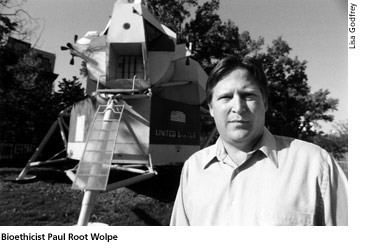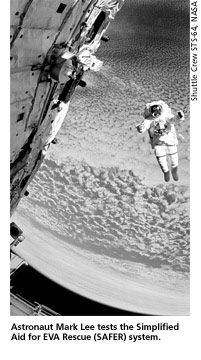
I Wish I Mite
Bioethicist Helps NASA Watch Out for Life on Earth

"I have a problem," Paul Root Wolpe, C'78, reported to NASA's
chief medical officer not long ago. "When I'm speaking as the bioethicist
of NASA, I have to talk differently than when I'm speaking as a faculty
member of Penn's Center for Bioethics. I'm not really sure how I should
be speaking when I'm speaking as the bioethicist of NASA."
In April, Wolpe was named the first chief of bioethics for the National Aeronautics and Space Administration. Since then, he has been struggling with the culture shock of going from an academic institution, which prizes free expression, to one whose culture is highly politicized, thickly bureaucratized, and strongly informed by a military sense of propriety and decorum. "It's on the other side of the globe in terms of how you handle things," says Wolpe. "I can't just shoot off my mouth.…[An outsider] has to be there for a while and just listen—and then you begin to get it."
"It's very simple," the NASA administrator told him. "Whenever you speak [for NASA], you represent the president of the United States."
The Elephant
In his office at the Center for Bioethics, which resembles the inside
of a file cabinet, Wolpe keeps the gag gifts friends have been sending
ever since the NASA appointment: foil envelopes of vacuum packed "astronaut"
ice cream sandwiches and a row of key-ring-size Space Shuttles, robots,
aliens, and astronauts. There's also a toy Superman.
 Wolpe
is an assistant professor of sociology in the School of Arts and Sciences.
He also holds an appointment in the psychiatry department in the medical
school and has directed the Project on Informed Consent for the Penn Human
Research Ethics Group. Besides being a faculty member and a fellow at
the Center for Bioethics, he devotes 40 percent of his time to putting
together NASA's new in-house bioethics office. "I've been going to
meetings and trying to figure out where to put my paperclips," he
says. "And I've been trying to get some sense of the scope of this
massive organization."
Wolpe
is an assistant professor of sociology in the School of Arts and Sciences.
He also holds an appointment in the psychiatry department in the medical
school and has directed the Project on Informed Consent for the Penn Human
Research Ethics Group. Besides being a faculty member and a fellow at
the Center for Bioethics, he devotes 40 percent of his time to putting
together NASA's new in-house bioethics office. "I've been going to
meetings and trying to figure out where to put my paperclips," he
says. "And I've been trying to get some sense of the scope of this
massive organization."
NASA is not only a foreign country; it's a big one. With an annual budget of $14 billion, the agency operates nine field centers, a jet propulsion laboratory, several research and test installations, and other facilities around the country. "Just one of them," he notes, such as the Johnson or the Kennedy Space Center, "is the size of a city.…Right now, I'm just a mite on the leg of the elephant, wondering what's around the corner."
Wolpe's task at NASA is to ensure that space exploration and the research that uses people (and animals) as test subjects are performed safely, humanely, and ethically. That means formulating high level policy for the space agency's clinical and research work, overseeing compliance with federal regulations, setting bioethics policy for Shuttle and other manned missions, formalizing unified bioethical standards with U.S. partners on the International Space Station, and generally providing the ethical expertise to complement and channel NASA's hardheaded, high-tech, can-do mindset.
What's Up? What's Down?
"They were looking for someone who knows human subjects protection,"
Wolpe explains, "someone who has informed-consent and human-research
experience.…The goal is to hold NASA to the highest ethical standards
while keeping in mind the inherent risks of space travel." That caveat
marks an important divergence—perhaps not quite on the other side
of the globe—from doing an ethical calculus for medical researchers.
Bioethicists who study human subjects protection attempt to clarify issues related to what terms like risk and benefit mean. They try to balance society's ethical priorities, which hold the individual in high regard, with the risks that subjects assume in research projects aimed at the advancement of medical science. To evaluate a trial of an experimental drug for treating multiple sclerosis, for instance, the ethicist weighs the risks assumed by patients taking the new pharmaceutical against the benefit of finding a cure for this chronic, often debilitating disease, which afflicts nearly half a million Americans.
In space, the weight of therapeutic urgency begins to diminish, and the ethical orientation for doing a risk/benefit calculus becomes less certain. "Space travel," notes Wolpe, "is a unique human endeavor that poses unique ethical challenges." For example: Astronauts spend four hours in a decompression chamber each time they don spacesuits for EVAs, "extravehicular" activities—NASAspeak for spacewalks. The space agency is currently doing tests on non-astronauts to see if decompression can be accelerated and the lost time of astronauts reduced for every stroll among the stars. About 10 to 15 percent of the volunteers for such experiments are likely to suffer a mild form of decompression sickness (DCS), Wolpe figures, and a smaller percentage risk type II DCS, which could inflict neurological damage and in some cases, death.
"A lot of NASA studies aren't really 'medical' in the pure sense of the term," he observes. "We're talking about a project that has scientific merit, yes, but what's the ethical equation here? Do we put 50 people at risk so three astronauts can [do more work] on the space station? Is the potential benefit of that the same as the benefit for finding a cure for multiple sclerosis, and if it's not, then do we allow more risk in the MS trial than we do in the trial for space-based information? There's no answer to that.…In space, you're not really sure where to hang your moral compass—how you get your moral bearings about what should be allowed and what shouldn't be allowed."
 Purists
would argue that the risk assumed for such a paltry benefit is a prohibitive
one, but Wolpe maintains that bioethicists cannot remain aloof from the
ethical concerns of institutions like NASA. The scholarship of ethics
must be more than an academic exercise, more than a set of unassailable
and intangible equations. Wolpe calls himself a "functioning ethicist,"
one who works with existing institutions where compromise is an inevitable
part of life. NASA gets billions of dollars to go into space—that's
a fact of life—and his job is to walk the tightrope of integrity
and politics to help them do it with greater circumspection.
Purists
would argue that the risk assumed for such a paltry benefit is a prohibitive
one, but Wolpe maintains that bioethicists cannot remain aloof from the
ethical concerns of institutions like NASA. The scholarship of ethics
must be more than an academic exercise, more than a set of unassailable
and intangible equations. Wolpe calls himself a "functioning ethicist,"
one who works with existing institutions where compromise is an inevitable
part of life. NASA gets billions of dollars to go into space—that's
a fact of life—and his job is to walk the tightrope of integrity
and politics to help them do it with greater circumspection.
There is a galaxy of knotty questions, and some mundane ones, waiting to be handled by his new office: How should astronauts deal with a severely injured crewmember on a three-year mission to Mars? Should astronauts be given performance-enhancing drugs that are proven harmful, even if having a faster response time could save their lives in space? Society is against genetic testing to determine fitness for jobs, but on a long-term space flight, would it be better to ground those at risk of developing a grave illness? Where is the line dividing "operational testing" of equipment that involves people, and human-subject research that, by law, must be monitored by an institutional review board?
"A big part of [what I do] is help pose the questions," Wolpe says, "and another part of it isn't just giving the answer but clarifying a range of possible answers" that NASA decision makers can use to set policy.
The Right Stuff
 Many
of NASA's ethical concerns are not unique to space exploration, and insights
that seem brilliant to rocket scientists, cyber wizards, and techno pioneers
may often be merely prosaic to a bioethicist. "I think their surprise
surprised them," Wolpe remarks of officials' responses to how he
handled the ethical conundrums they posed during his interview. "They
didn't realize that people had done a lot of creative thinking about these
things already and that there were ready-made solutions to some of the
problems they had been agonizing over."
Many
of NASA's ethical concerns are not unique to space exploration, and insights
that seem brilliant to rocket scientists, cyber wizards, and techno pioneers
may often be merely prosaic to a bioethicist. "I think their surprise
surprised them," Wolpe remarks of officials' responses to how he
handled the ethical conundrums they posed during his interview. "They
didn't realize that people had done a lot of creative thinking about these
things already and that there were ready-made solutions to some of the
problems they had been agonizing over."
NASA's legacy of astonishing feats and last-minute saves has become the stuff of popular myth, and Wolpe is quick to point out that he too admires its heady achievements. "NASA is a giant engineering company," he notes, "probably the largest engineering company in the world." That's a great strength, the very source of NASA's triumphs, but it can be a weakness too.
As it goes about the highly specialized business of space science and exploration, the legendary agency can't always track how its every movement affects the multitude of mites, especially when operatives are used to thinking in terms of ropes and pulleys, gears and levers, thrust and gigabytes. It's not that the elephant has no regard for the mites. NASA has long consulted with outside collaborators on ethical matters, "but that's a very different thing than having someone in-house looking in a day-to-day, micro way at a whole series of issues," Wolpe contends.
"My job is to make sure NASA doesn't hurt people," he says, to help the ponderous pachyderm place its feet with care. For that job, a bioethicist is the one who has the right stuff.